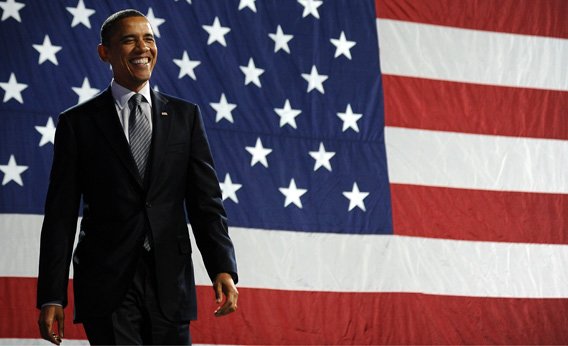
Barack Obama has already held more re-election fundraising events than every elected president since Richard Nixon combined, according to figures to be published in The Rise of the President’s Permanent Campaign by Brendan J. Doherty.
Barack Obama is also the only president in the past 35 years to visit every electoral battleground state in his first year of office.
The figures, contained in The Rise of the President’s Permanent Campaign, due to be published by University Press of Kansas in July, give statistical backing to the notion that Barack Obama is more preoccupied with being re-elected than any other commander-in-chief of modern times.
Brendan J. Doherty, who has compiled statistics about presidential travel and fundraising going back to President Jimmy Carter in 1977, found that Barack Obama had held 104 fundraisers by March 6th this year, compared to 94 held by Presidents Jimmy Carter, Ronald Reagan, George Bush Sr., Bill Clinton and George W. Bush combined.
Since then, Barack Obama has held another 20 fundraisers, bringing his total to 124. Jimmy Carter held four re-election fundraisers in the 1980 campaign, Reagan zero in 1984, George Bush Sr. 19 in 1992, Bill Clinton 14 in 1996 and George Bush Jr. 57 in 2004.
Brendan J. Doherty, a political science professor at the United States Naval Academy in Annapolis, Maryland, has also analyzed presidential travel to battleground or swing states, which change and fluctuate in number with each election cycle.
In their first years in office, Jimmy Carter visited eight out of 18 battleground states and Ronald Reagan seven out of 17. Bush Sr., Clinton and Bush Jr. all visited around three-quarters of battleground states while Barack Obama went to all 15 within his first 12 months.
While the Obama’s campaign activities in office have been largely in line with historical trends, he is especially vulnerable to criticism because in 2008 he promised to change how politics works and to curb links with special interests.
Vowing in 2008 to “launch the most sweeping ethics reform in US history” Barack Obama said that if elected he would “make government more open, more accountable and more responsive to the problems of the American people”.

In his State of the Union speech in January, Barack Obama bemoaned the “corrosive influence of money in politics”. The following month, he reversed course and announced he was allowing cabinet members and top advisors to speak at big money events for so-called super PACs – unaccountable outside groups raising money for his re-election.
During the 2008 election, Barack Obama abandoned a pledge to opt for public funding of his campaign, instead opting to raise an unlimited amount privately. He then raised and spent approximately $730 million, almost double the campaign funds of Senator John McCain, his Republican opponent.
Up to the end of March, Barack Obama had raised $191.6 million for his re-election bid, compared to $86.6 million raised by his Republican challenger Mitt Romney. His frenetic fundraising activities are in part because he is lagging behind campaign expectations. Early last year, some advisers spoke privately of raising $1 billion.
In his book, Brendan J. Doherty writes that in his first full month in office Barack Obama visited Indiana, Florida, Colorado, Arizona and North Carolina – all battleground states – in 2012.
“Clearly, the White House made a point of the president travelling to key electoral states early in his term in office.”
This week, the Republican National Committee (RNC) lodged a formal complaint with the Government Accountability Office (GAO) about alleged misuse of taxpayer money by Barack Obama.
The Obama campaign dismissed the complaint as a “stunt” and the White House said that it would follow the same rules as previous administrations and refund the appropriate amounts.
In the complaint, Reince Priebus, RNC chairman, wrote: “Throughout his administration, but particularly in recent weeks, President Obama has been passing off campaign travel as <<official events>>, thereby allowing taxpayers, rather than his campaign, to pay for his re-election efforts.”
Brendan J. Doherty, however, said that although the tactic of labeling Barack Obama’s activities as fraud was “novel” in reality the opposing party always complained about a president facing re-election dressing up political events as official ones.
“This is not new. The Republican complaint is more of a situational complaint than a principled complaint because they certainly weren’t complaining when George W. Bush did this eight years ago.”
He added: “In 2004, President George W. Bush broke all records for presidential fundraising in terms of time devoted to fundraising and in terms of money raised and at the time Democrats hit him hard for that.
“Obama has already surpassed Bush [Jr.] in numbers of re-election fundraisers, but not yet in money raised.”
The rising costs of campaigns, lower contribution limits, the breakdown of the public financing system, the 24/7 media environment and the professionalization of campaigns had all led to successive presidents having to devote more and more time and energy to raising money.
He added that the “big picture” was incumbent presidents fearing defeat.
“Until 1976 [when Jimmy Carter beat President Gerald Ford] no sitting president had been defeated for re-election since 1932. It had been 44 years.
“And then three of the next four presidents who tried [Ford, Carter and Bush Sr.] lost. Of all the presidents re-elected since Ford lost to Carter, only Reagan has won in a landslide. George W. Bush’s re-election [in 2004] was close, Clinton got less than 50 percent [in 1996]. There is a very keen sense among presidents that they really might lose.”
Kirsten Kukowski, an RNC spokesperson, said: “It’s no surprise that the Campaigner-In-Chief has taken raising money for his re-election to a whole new level. The worst part is the American taxpayer has been footing the bill.”
The Obama campaign did not respond to a request for comment.